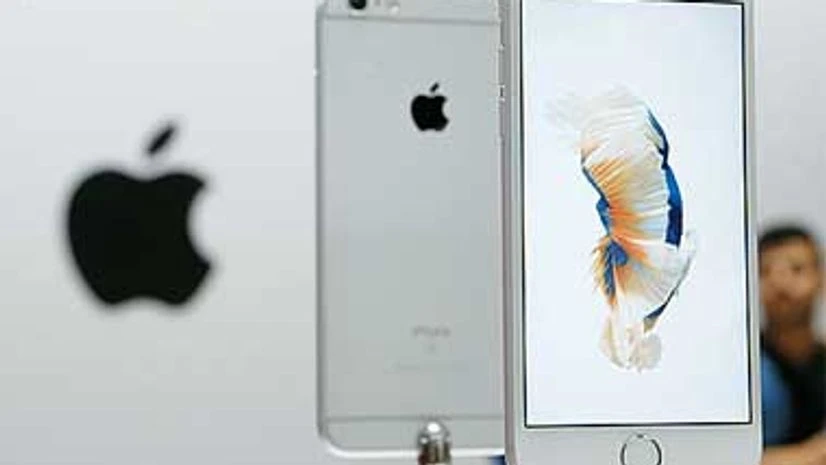The iPhone fuelled Apple's ascendance into the world's most valuable company. But even iPhone sales have their limits. Apple on Tuesday reported results for its fiscal first quarter that showed iPhone sales rose less than 1 per cent from a year earlier, the slowest year-over-year growth rate ever for the device, which accounts for about two-thirds of the company's revenue. Apple also issued a sales forecast that signalled that the sluggishness would continue, with the company projecting its first revenue decline in more than a decade.
The results and guidance reflect how Apple, under its chief executive, Timothy D Cook, is grappling with becoming a maturing tech company and is now entering a period of slow growth. While Apple once delivered high double-digit revenue gains on the back of soaring sales of the iPhone and other devices, that has decelerated as the iPhone has begun saturating the market and the company has not introduced a new blockbuster device.
The performances raise questions about what Apple will do to satisfy investors who want growth and consumers who want new, cutting-edge technology. Some investors are already treating Apple more like a value stock than a growth stock, associating the company with predictable business results and a reliable dividend rather than runaway revenue growth. In a conference call with analysts on Tuesday, Cook said that the slowdown at Apple was indicative of greater global economic and financial market uncertainty.
"We're seeing extreme conditions, unlike anything we've experienced before, just about everywhere we look," Cook said, calling the global macroeconomic environment "challenging." Shares of Apple, which are down more than 11 per cent over the last year, fell 2.6 per cent in after-hours trading after the results were announced.
For the quarter that ended December 26, Apple said it sold 74.8 million iPhones, essentially flat from the 74.5 million sold a year ago. In total, revenue was $75.9 billion, up 1.7 per cent from a year ago, and lower than Wall Street forecasts of $76.6 billion. Net profit was $18.4 billion, up from $18 billion a year earlier.
For the current quarter, which ends in March, Apple projected revenue of $50 billion to $53 billion. That would be down from $58 billion from a year earlier and lower than the $55.4 billion forecast by Wall Street, according to S&P Capital IQ.
In the period leading up to the earnings announcement, investors had lowered expectations for the quarter based on the belief that demand for Apple's latest iPhones, the 6S and 6S Plus, had been weak. Several companies that supply iPhone parts to Apple recently blamed a lack of demand for their lower-than-expected financial results. "There will be some speed bumps ahead until we get to the iPhone 7 mega-product cycle later this year," said Daniel Ives, an analyst at FBR Capital Markets. Luca Maestri, Apple's chief financial officer, said in an interview that the results were affected by the strengthening United States dollar.
"In the December quarter alone, the foreign exchange impact was $5 billion to our revenue line," he said. "If you take $100 of the business that we did outside of the US in September 2014, when we launched the iPhone 6 and 6 Plus, the same level of business today translates to only $85."
Other growth areas that Apple has relied upon are also starting to experience a slowdown. Sales in the greater China region, which includes China, Hong Kong and Taiwan, rose 14 per cent in the quarter from a year ago - yet annual revenue growth from the region has hovered at around 70 per cent or more in the last four quarters.
With the iPhone's sales growth flattening, other products did not pick up the slack. Sales of the iPad tablet dropped 25 per cent from a year earlier in terms of units, while Mac computers declined 4 per cent.
The company did see growth in services, where revenue rose 26 per cent, while revenue from a category known as other products - which include the Apple Watch - increased 62 per cent. Maestri said that Apple would continue to raise money in debt markets in the United States and abroad to continue to return money to investors in the form of dividends and stock buybacks. Because Apple houses the majority of its $216 billion in cash overseas, it has borrowed money over the last three years to pay out more than $9 billion to investors.
As Apple matures, Maestri said, the company could also become a business that delivers steady financial advances through its huge installed base of one billion active devices currently used by consumers. He pointed in particular to the potential of the services business, which includes the iTunes Store, the App Store and Apple Music.
"The market has not fully understood that we have a portion of our business directly tied to our incredible installed base that's not driven by quarterly results," Maestri said.
Cook echoed that sentiment. "Especially during periods of economic uncertainty, it's important to appreciate that a significant portion of Apple's revenue occurs over time," he said. He added that the popularity of the iPhone provided the company a "long-lasting foundation."
©2016 The New York Times News Service

)
